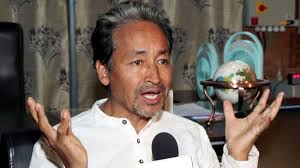Politics
Climate Activist Sonam Wangchuk Arrested Amid Protests in Ladakh

Climate activist Sonam Wangchuk was arrested by police on September 29, 2023, following protests in Ladakh that resulted in four deaths and over 90 injuries. The protests, which were demanding statehood for Ladakh and recognition under the Sixth Schedule of the Indian Constitution, escalated tensions in the Union Territory. Wangchuk was taken into custody at around 14:30 local time, led by S D Singh Jamwal, the chief of Ladakh Police, and has since been relocated out of Ladakh.
While details regarding the specific charges against Wangchuk have not been officially disclosed, sources within the Ladakh administration indicate that the National Security Act (NSA) has been invoked. This law allows for preventive detention in certain circumstances, underscoring the severity of the situation. In a related move, local authorities suspended mobile internet services in the Leh area as a precautionary measure to control the unrest.
Wangchuk’s Activism and Its Impact
Wangchuk is a prominent leader of the Leh Apex Body (LAB) and the Kargil Democratic Alliance (KDA), organizations that have been at the forefront of advocating for the rights of residents in Leh and Kargil. Since the formation of the Ladakh Union Territory from the former state of Jammu and Kashmir in 2019, he has led a five-year-long campaign calling for statehood and constitutional safeguards for the region’s inhabitants.
The Indian government has attributed the recent violence to incitement by Wangchuk, a claim he has vehemently denied. His arrest comes amidst heightened tensions as the community seeks greater autonomy and recognition of its unique identity within India.
Community Response and Future Implications
The reaction to Wangchuk’s detention has been mixed, with some supporters rallying behind him while others express concerns about the implications for civil liberties in the region. The use of the NSA in this context raises questions about the balance between maintaining public order and respecting democratic rights.
As the situation develops, the international community will likely be watching closely, given the ongoing debate around governance and autonomy in Ladakh. The future of Wangchuk’s activism and its impact on the region’s political landscape remains uncertain.
Wangchuk’s case highlights the broader struggle for recognition and rights in Ladakh, which continues to be a focal point of contention in Indian politics. The coming weeks may determine the trajectory of this movement and the government’s response to the demands of its citizens.
-

 World5 months ago
World5 months agoSBI Announces QIP Floor Price at ₹811.05 Per Share
-

 Lifestyle5 months ago
Lifestyle5 months agoCept Unveils ₹3.1 Crore Urban Mobility Plan for Sustainable Growth
-

 Science4 months ago
Science4 months agoNew Blood Group Discovered in South Indian Woman at Rotary Centre
-

 World5 months ago
World5 months agoTorrential Rains Cause Flash Flooding in New York and New Jersey
-

 Top Stories5 months ago
Top Stories5 months agoKonkani Cultural Organisation to Host Pearl Jubilee in Abu Dhabi
-

 Sports4 months ago
Sports4 months agoBroad Advocates for Bowling Change Ahead of Final Test Against India
-

 Science5 months ago
Science5 months agoNothing Headphone 1 Review: A Bold Contender in Audio Design
-

 Top Stories5 months ago
Top Stories5 months agoAir India Crash Investigation Highlights Boeing Fuel Switch Concerns
-

 Business5 months ago
Business5 months agoIndian Stock Market Rebounds: Sensex and Nifty Rise After Four-Day Decline
-

 Sports4 months ago
Sports4 months agoCristian Totti Retires at 19: Pressure of Fame Takes Toll
-

 Politics5 months ago
Politics5 months agoAbandoned Doberman Finds New Home After Journey to Prague
-

 Top Stories5 months ago
Top Stories5 months agoPatna Bank Manager Abhishek Varun Found Dead in Well









